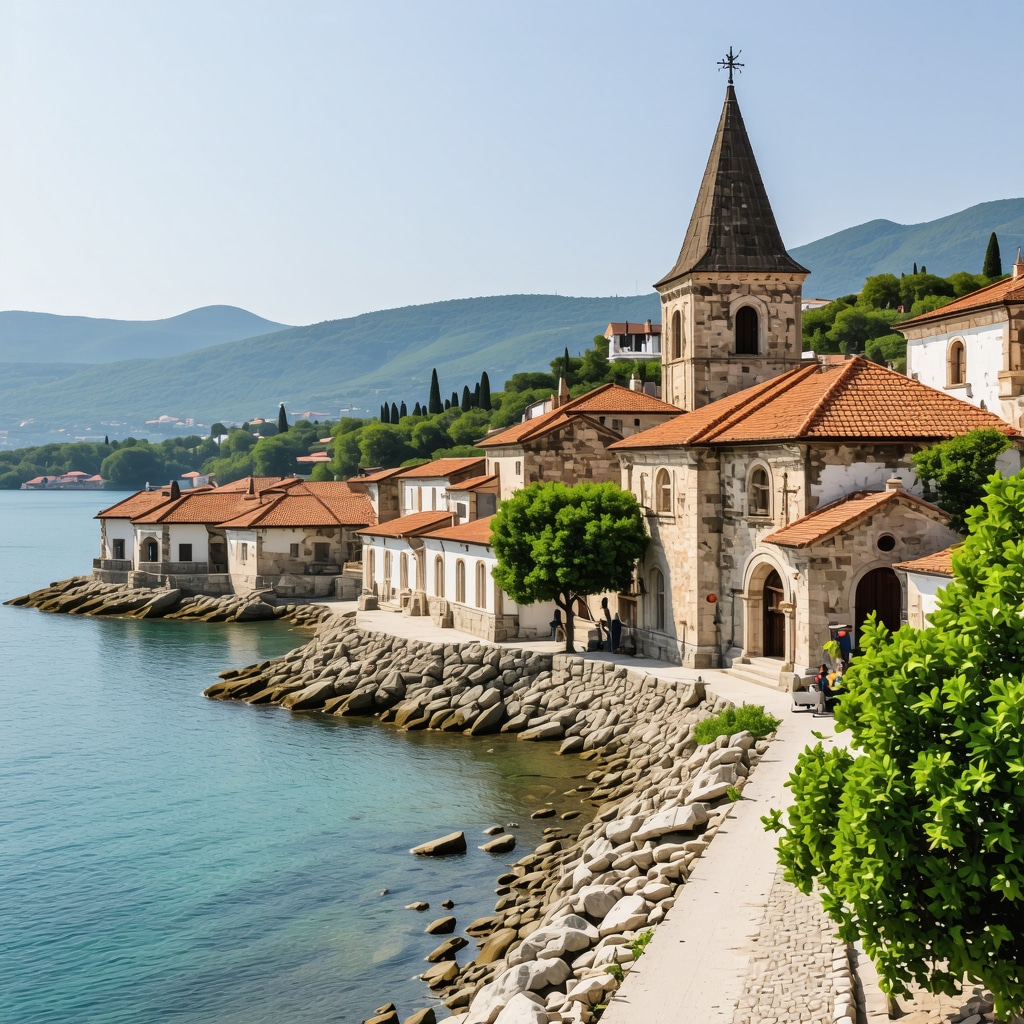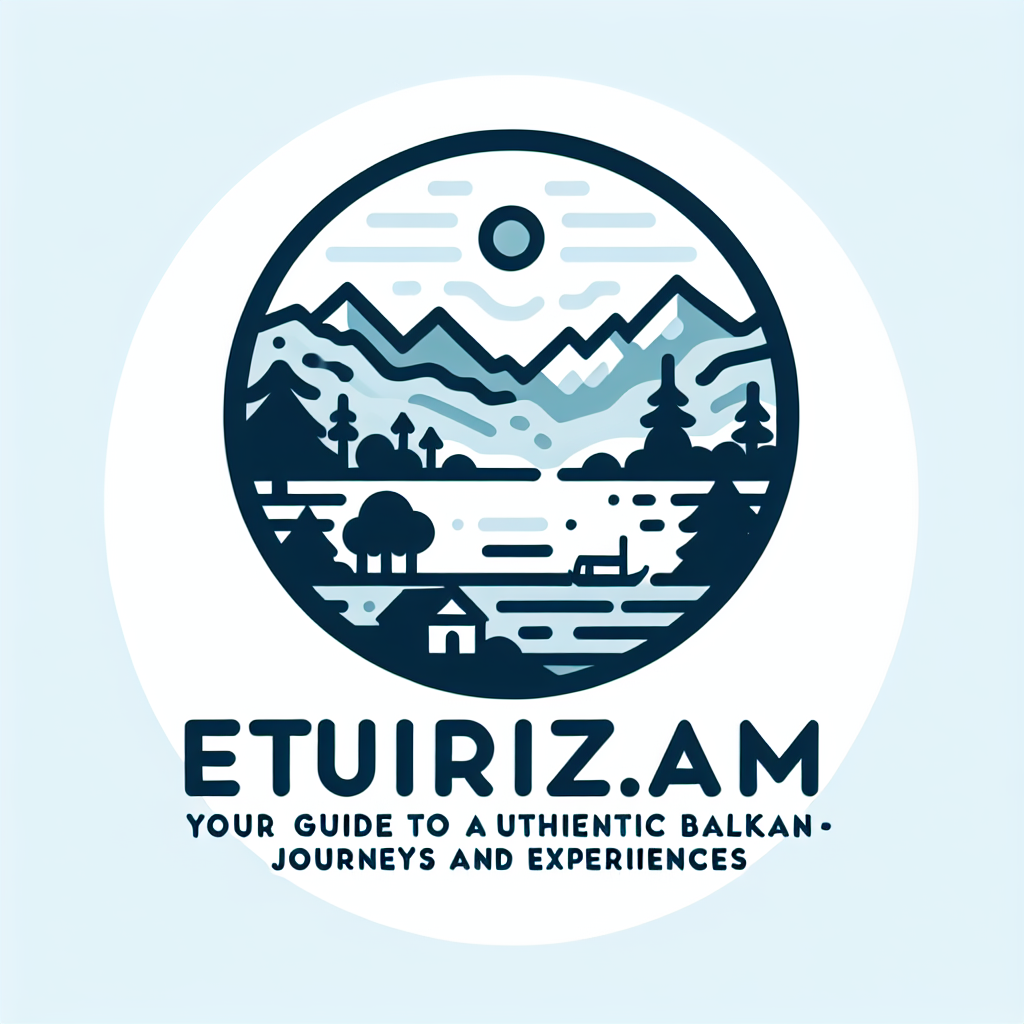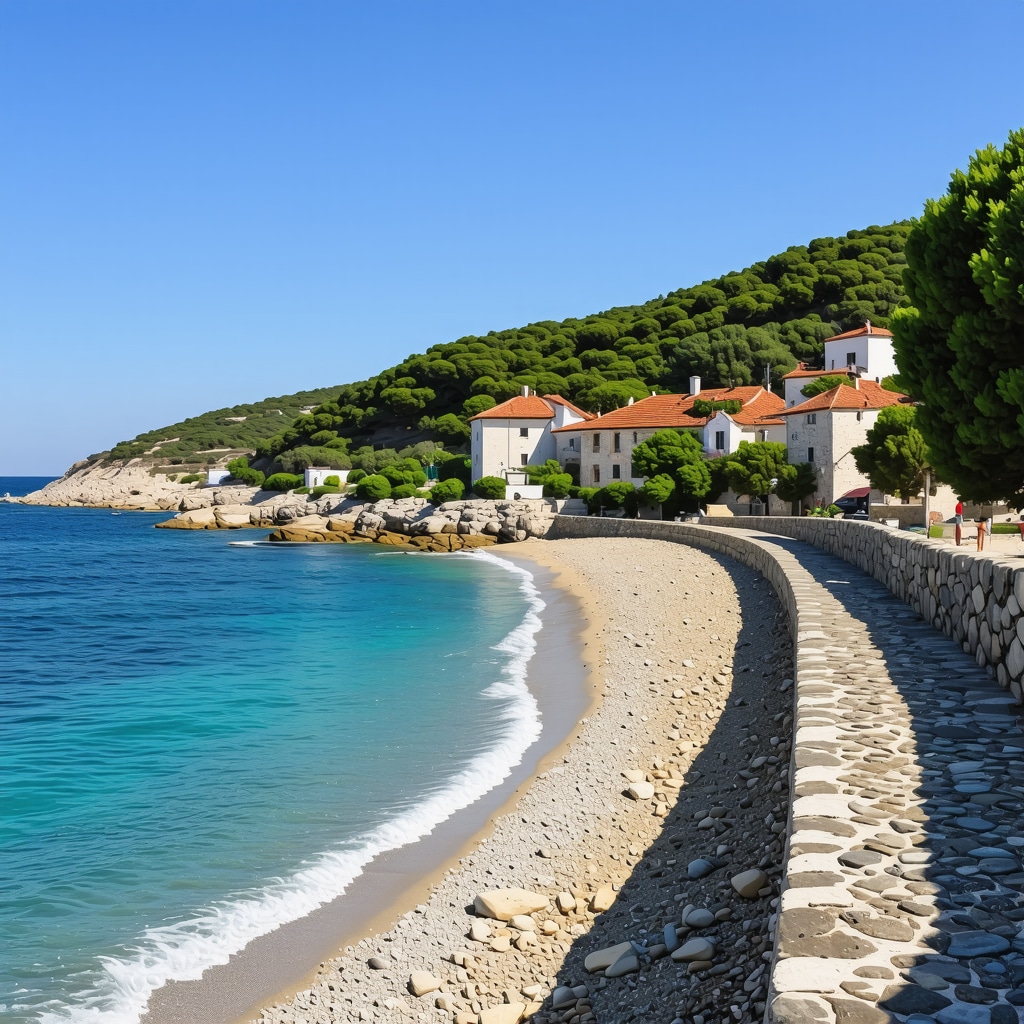My First Encounter with Sozopol: A Personal Journey into Bulgaria’s Coastal Treasure
Last summer, I decided to escape the hustle and bustle of city life and explore the enchanting town of Sozopol. From the moment I set foot on its golden beaches, I felt a wave of tranquility wash over me. The town’s rich history and stunning scenery instantly captured my heart, making it a destination I’ll cherish forever. If you’re a beach lover or a cultural explorer, Sozopol truly is a hidden gem for 2024.
Why Sozopol Stands Out as a Coastal Paradise
Sozopol’s unique charm lies in its blend of pristine beaches and historical ambiance. The crystal-clear waters invite you to relax and swim, while the narrow cobblestone streets and ancient wooden houses tell stories of centuries past. The town’s location on Bulgaria’s Black Sea coast offers breathtaking views and a peaceful atmosphere that’s perfect for unwinding. I particularly enjoyed walking along the seafront promenade, where vibrant cafes and local artisans showcase the town’s lively spirit.
Unveiling Cultural Richness: A Personal Perspective
One of the highlights of my trip was visiting the Old Town, where centuries-old churches and archaeological sites highlight Sozopol’s deep-rooted history. Walking through its ancient streets, I couldn’t help but imagine the lives of those who once called this place home. The annual Apollonia Arts Festival was a particularly memorable event, where local artists and performers brought the town to life with music, dance, and visual arts. This experience reaffirmed how Sozopol seamlessly combines cultural heritage with modern vibrancy.
What Makes Sozopol a Must-Visit Destination in 2024?
From my personal experience, Sozopol offers an authentic escape for travelers seeking a mix of relaxation and cultural enrichment. Its unspoiled beaches, delicious seafood, and warm hospitality make it stand out among Mediterranean and Black Sea resorts. Additionally, the town’s proximity to other scenic sites in Bulgaria makes it an ideal base for exploring the region’s natural and historical treasures. For more insights on nearby destinations, I recommend checking out the exploration of the Balkan Gulf.
How can I truly immerse myself in Sozopol’s local culture?
Attending local festivals, tasting traditional cuisine, and engaging with artisans are excellent ways to experience the authentic spirit of Sozopol. Don’t miss the chance to try the freshly caught seafood and participate in traditional crafts workshops. Sharing these moments with locals enriches your visit and creates lasting memories.
If you’ve already been to Sozopol or plan to visit, I’d love to hear your experiences! Feel free to share your tips or stories in the comments below. And for those interested in discovering more about Bulgaria’s enchanting coastlines and historic sites, explore the tourist destinations in the region.
Exploring Bulgaria’s Coastal and Cultural Riches: A Guide for 2024
As travel enthusiasts seek authentic and memorable experiences in 2024, Bulgaria’s diverse landscapes and historical sites continue to captivate adventurers. From the sun-kissed beaches of Sozopol to the ancient ruins and vibrant festivals, this country offers a perfect blend of relaxation and cultural immersion. For those eager to deepen their journey, exploring lesser-known destinations and engaging with local traditions can turn a trip into a truly transformative experience.
Why Bulgaria’s Coastal Towns Are a Must-Visit in 2024
Beyond the popular resorts, Bulgaria’s coastline boasts hidden paradises like Kiten and Sinemorets, where pristine beaches and untouched nature await. These spots provide a peaceful retreat away from crowded tourist hubs, ideal for families and solo travelers alike. The region’s rich history is reflected in sites such as Nessebar, a UNESCO World Heritage site, where ancient churches and cobblestone streets tell stories of centuries past. To get a comprehensive understanding of the region’s cultural depth, I recommend exploring the history of the Balkans.
The Cultural Tapestry of Bulgaria: Traditions, Festivals, and Heritage
Participating in local festivals is one of the most enriching ways to experience Bulgaria’s vibrant culture. Events like the Rose Festival in Kazanlak celebrate the region’s famous rose oil and traditional crafts, offering a glimpse into centuries-old practices. Engaging with artisans during craft workshops or sampling traditional dishes like banitsa and shopska salad provides an authentic taste of Bulgarian hospitality. These experiences not only deepen your appreciation but also support local communities dedicated to preserving their heritage.
What Are the Challenges in Preserving Bulgaria’s Cultural and Natural Heritage?
While Bulgaria’s treasures are abundant, balancing tourism development with conservation remains a complex challenge. Over-tourism can threaten delicate ecosystems and historical sites, making sustainable tourism practices essential. Initiatives by local authorities aim to promote responsible travel, encouraging visitors to respect natural landscapes and cultural landmarks. For a deeper dive into how regions are safeguarding their heritage, visit the privacy policy page for insights into preservation efforts.
How can travelers contribute to sustainable tourism in Bulgaria?
Being mindful of your environmental impact, supporting eco-friendly accommodations, and participating in community-led tours are effective ways to ensure your visit benefits local populations and preserves Bulgaria’s beauty for future generations. Sharing your experiences and encouraging others to choose responsible options can amplify positive change across the region.
If you’re passionate about uncovering more of Bulgaria’s scenic routes, cultural landmarks, and hidden treasures, I suggest exploring the European travel guide for practical tips and inspiring itineraries. Your journey can enrich your understanding of the Balkans’ diverse heritage and natural wonders.
Reflections on the Complexity of Preserving Bulgaria’s Coastal Heritage
As I immersed myself further into Bulgaria’s coastal towns, I realized that the true challenge lies not just in discovering these places but in understanding the delicate balance between tourism and preservation. Every cobblestone street and ancient ruin whispers stories of resilience and cultural continuity, yet these treasures face threats from overdevelopment and environmental degradation. My experience taught me that sustainable tourism isn’t simply a buzzword but a vital practice that requires active participation from travelers and local communities alike.
For instance, during my visit to Nessebar, a UNESCO World Heritage site, I observed how local authorities and residents are working tirelessly to maintain the town’s authenticity amidst increasing visitor numbers. Initiatives like eco-friendly tours and preservation workshops underscore the importance of responsible engagement. Engaging with these efforts made me reflect on how each of us can contribute—by choosing eco-conscious accommodations, respecting local customs, and supporting initiatives that prioritize conservation.
Personal Lessons Learned from Engaging with Bulgaria’s Cultural Tapestry
One of the most profound lessons from my journey was the realization that Bulgaria’s cultural richness is a living, breathing entity. Participating in traditional festivals like the Rose Festival in Kazanlak, I saw firsthand how generations preserve their heritage through music, dance, and craftwork. These experiences deepen my appreciation for how cultural identity is maintained amid modern influences. It’s a reminder that authentic travel involves more than sightseeing; it’s about truly engaging with and honoring local traditions.
In exploring lesser-known regions, I discovered that the stories of everyday life—shared in local cafes or during craft workshops—are often more illuminating than guidebook narratives. These moments foster a genuine connection and a deeper understanding of the region’s soul. I encourage fellow travelers to seek out these authentic exchanges, which can transform a mere visit into a meaningful cultural dialogue.
How Can I Truly Experience Bulgaria’s Living Heritage?
Deep immersion involves more than attending festivals or tasting dishes; it’s about understanding the underlying narratives that shape a community’s identity. For example, engaging with artisans who craft traditional pottery or textiles reveals centuries-old techniques passed down through generations. Supporting these artisans not only sustains their craft but also preserves an essential thread in Bulgaria’s cultural fabric. To deepen your experience, consider participating in local workshops or even staying with host families, making your journey more personal and impactful.
As I continue to explore, I find that the most rewarding experiences come from stepping beyond the tourist trail and embracing the complexities of local life. The region’s natural beauty, intertwined with its cultural stories, offers endless opportunities for discovery. If you’re interested in exploring more about Bulgaria’s diverse landscapes and rich heritage, I recommend diving into the regional travel guides that highlight lesser-known yet profoundly meaningful destinations.
Inviting Shared Experiences and Personal Insights
If you’ve had the chance to visit Bulgaria’s coastlines or are planning your journey, I’d love to hear about your experiences. Sharing stories about meaningful encounters, local traditions, or even challenges faced during travel can inspire others to approach their adventures with respect and curiosity. Feel free to leave a comment or reach out through my contact page. Remember, every trip is an opportunity to learn, grow, and contribute positively to the places we visit.
Exploring Bulgaria’s coastal and cultural landscapes is more than a travel experience; it’s a journey into understanding the enduring spirit of a region that beautifully balances tradition and modernity. Whether through quiet walks along the untouched beaches or lively festival celebrations, each moment adds to a richer, more nuanced appreciation of this captivating country.
Unearthing Bulgaria’s Coastal Secrets: A Personal Reflection on Preservation and Cultural Depth
As I delved further into Bulgaria’s coastal tapestry, I was struck by the intricate dance between historical preservation and modern tourism. The towns like Nessebar and Sozopol stand as testaments to resilience, where centuries-old architecture coexists with contemporary life. My visits revealed how local communities actively engage in safeguarding their heritage through initiatives such as eco-tourism projects and cultural workshops, which are essential in maintaining authenticity amidst increasing visitor numbers. For instance, the UNESCO-listed Nessebar has implemented sustainable practices that serve as models for other heritage sites, emphasizing the importance of responsible tourism. When I explored these efforts firsthand, I realized that meaningful travel demands participation—supporting local artisans, respecting conservation efforts, and spreading awareness about sustainable practices.

Beyond the Surface: Engaging with Bulgaria’s Living Cultural Heritage
Authentic travel is rooted in immersing oneself in the living traditions that define a region. During my journeys, I participated in traditional crafts workshops, where artisans passed down age-old techniques in pottery, embroidery, and woodwork. Engaging directly with these crafts not only supported local economies but also deepened my understanding of Bulgaria’s cultural resilience. Moreover, attending festivals such as the Rose Festival in Kazanlak, I witnessed how cultural identity is preserved through music, dance, and storytelling, creating a vibrant mosaic of heritage that continues to thrive. For travelers eager to deepen their cultural engagement, I recommend exploring regional guides that highlight lesser-known yet profoundly meaningful destinations, such as the ancient routes connecting Bulgaria to its neighboring countries, which reveal a shared Balkan heritage rich in stories and traditions—check out the comprehensive history of the Balkans guide for more insights.
How can travelers contribute to the preservation of Bulgaria’s intangible cultural assets? Supporting local artisans, participating in community-led events, and advocating for sustainable tourism policies are vital steps. Sharing your experiences and encouraging others to embrace responsible travel can foster a collective effort to sustain Bulgaria’s rich cultural landscape for generations to come. If you’re inspired to explore more of Bulgaria’s hidden treasures and cultural narratives, I invite you to dive into the detailed regional travel guides that highlight authentic experiences beyond the typical.
Sustainable Tourism: A Personal Commitment to Bulgaria’s Future
Having experienced Bulgaria’s coastal towns firsthand, I realized that sustainable tourism isn’t merely a concept but a necessity. My encounters with local conservation initiatives, such as eco-friendly tours and community workshops, underscored how profound a traveler’s impact can be when guided by respect and responsibility. Initiatives like the preservation efforts in the ancient town of Sozopol, which balances modernization with heritage conservation, exemplify how responsible tourism can foster mutual benefit. Engaging with these initiatives, I learned that conscious choices—like opting for eco-certified accommodations and participating in local conservation projects—are powerful tools for making a positive impact. These efforts align with global sustainable tourism standards, such as those outlined by the UNWTO, reinforcing the importance of responsible travel practices. I encourage fellow travelers to reflect on their journey’s footprint and actively support initiatives that prioritize ecological integrity and cultural authenticity.
Would you like to explore more advanced strategies for responsible tourism in Bulgaria or share your experiences? Your insights can inspire a broader movement toward sustainable travel—reach out or leave a comment, and let’s continue this meaningful dialogue. Remember, every journey can be a step toward preserving the invaluable cultural and natural heritage of Bulgaria and beyond.” ,
Things I Wish I Knew Earlier (or You Might Find Surprising)
Local Traditions Still Thrive
One thing I learned was how deeply rooted local traditions are in Bulgarian towns. Participating in a small village festival, I was amazed at how authentic and lively these celebrations are, often passing unnoticed by mainstream tourists. It made me realize that exploring beyond the popular destinations reveals a rich cultural tapestry that’s alive and well.
The Best Time to Visit Is Not Always Peak Summer
Initially, I thought summer was the only good time to enjoy Bulgaria’s coastlines, but I discovered that late spring and early autumn offer milder weather, fewer crowds, and more genuine local interactions. These seasons turned out to be my favorite for both sightseeing and relaxing on the beaches.
Sustainable Tourism Is Closer Than You Think
While I was concerned about over-tourism, I found many eco-friendly initiatives, from community-led tours to conservation projects, that make it easy to travel responsibly. Supporting local artisans and staying in eco-certified accommodations helped me contribute positively during my trip.
Hidden Natural Wonders Are Truly Breathtaking
Beyond the well-known sites, Bulgaria has untouched natural spots like the Rhodope Mountains and secluded beaches that are surprisingly accessible. These places offered a peaceful retreat and unique photo opportunities I won’t forget.
Resources I’ve Come to Trust Over Time
- UNWTO (United Nations World Tourism Organization): Their reports and guidelines on sustainable tourism helped me understand how to travel responsibly and support local communities effectively.
- Visit Bulgaria Official Website: This site provided reliable updates on regional events, safety tips, and authentic experiences, making planning much smoother.
- Travel blogs and local guides: Personal stories and tips from seasoned travelers gave me insights that no guidebook could offer, enriching my experience.
Parting Thoughts from My Perspective
Exploring Bulgaria’s hidden treasures taught me that responsible travel is not just a trend but a necessity. The country’s natural beauty and vibrant culture deserve our respect and care. My biggest takeaway is to approach each journey with curiosity and an intention to learn and preserve. If this resonated with you, I’d love to hear your thoughts or experiences—feel free to share in the comments or reach out through my contact page. Remember, every trip is an opportunity to contribute positively to the places we love, ensuring they remain enchanting for generations to come.


Reading about Sozopol really takes me back to my own trip there last year. I was struck by how effortlessly the town preserves its historical charm while still feeling lively and inviting. The cobblestone streets and old wooden houses have such an authentic vibe that it’s hard to find elsewhere. I remember exploring the old churches and then relaxing in a seaside cafe with fresh seafood—it’s the perfect balance of culture and nature.
One thing I’d add for anyone visiting is to try participating in local craft workshops, similar to what the author mentioned about Bulgaria in general. It really deepens the experience when you engage directly with artisans. Also, do you think there are emerging sustainable practices in Sozopol that tourists can support? I’d love to hear how the town is balancing tourism growth with conservation efforts, especially since it’s such a treasured site.